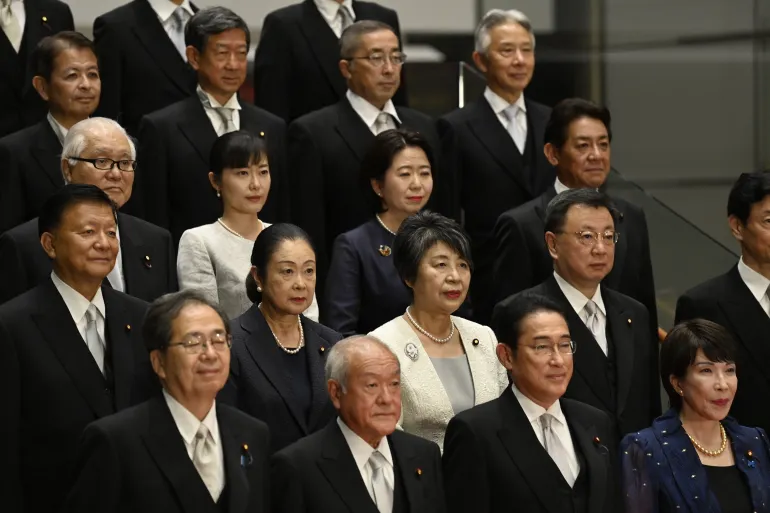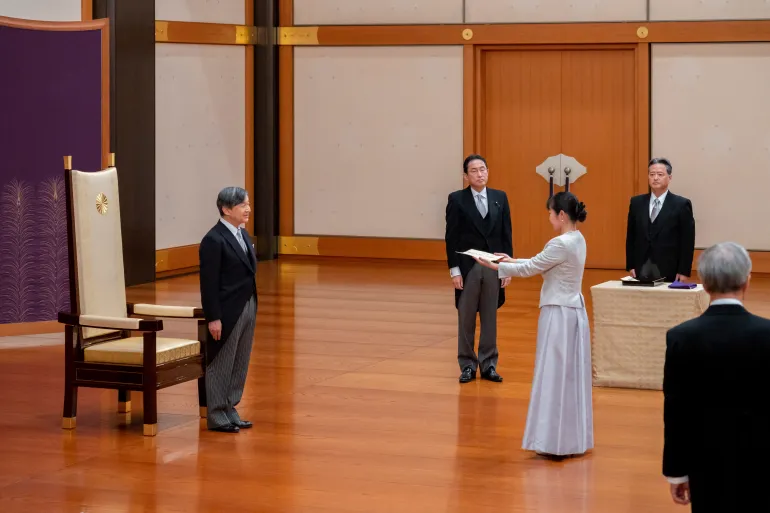Fumio Kishida, Japan’s Prime Minister, Banking on Women to Revive Political Prospects.
Kishida’s popularity among the public is waning due to worries about slow wage increases and the increasing cost of living.

In Tokyo, Japan, Prime Minister Fumio Kishida has undertaken a cabinet reshuffle by appointing five women, marking the highest number since 2014. This move is aimed at improving his low approval ratings. Among the notable cabinet additions, Yoko Kamikawa stands out as Japan’s first female Minister of Foreign Affairs in nearly two decades.
At her inaugural press conference since assuming office, she expressed a desire to showcase Japan’s global presence and cultivate trust with international counterparts. Furthermore, she emphasized Japan’s intention to encourage “responsible actions from China” while maintaining ongoing dialogue with the neighboring nation in an effort to mend their strained relations.
The 70-year-old leader previously served as Japan’s justice minister and oversaw the execution of prominent individuals linked to the Aum Shinrikyo doomsday cult, responsible for the deadly sarin gas attack on the Tokyo metro system in 1995.
This cabinet reshuffle on Wednesday coincides with a decline in support for Prime Minister Kishida’s party. According to an August Kyodo News poll, only 33.6 percent of Japanese citizens currently endorse the prime minister. Approval ratings have been steadily decreasing since July 2022, reaching a low point of 33.1 percent last December.
Kishida hopes that appointing more women will help bolster his popularity among progressive and younger voters.
Prior to Wednesday’s announcement, there were only two female members out of the 19 in the cabinet. Japan’s representation of women in politics is notably deficient when compared to other countries, ranking 138th out of 146 nations in terms of gender equality in politics, as reported by the World Economic Forum.
Jeffrey Hall, a special lecturer in Japanese Studies at Kanda University of International Studies, commented, “[This] represents a modest step in the right direction for a political party with a historically poor track record of female representation.”
Among the newly appointed female cabinet members, Hanako Jimi, a former medical doctor, has taken on the role of Minister for Regional Revitalization. Ayuko Kato, the youngest cabinet member at 44 years old, has been tasked with overseeing child policies. She previously worked as a management consultant and is the daughter of a renowned politician. The position of reconstruction minister is now held by Shinako Tsuchiya, formerly a culinary researcher and flower artist.
Yuko Obuchi, appointed to lead the ruling Liberal Democratic Party’s (LDP) election strategy committee, also comes from a political dynasty. She is the daughter of the late Prime Minister Keizo Obuchi, who himself was the son of a member of parliament.
A former industry minister, Obuchi was compelled to step down in 2014 due to a political fund scandal. However, she has since regained the trust of Kishida.
He expressed his desire for her to showcase her skills and contribute to advancing the party’s objective of ensuring that women occupy 30 percent of its parliamentary seats within a decade.
Hall observed that although appointing five women to prominent government roles was a notable step, it wouldn’t solve the LDP’s broader issue of favoring male candidates over female ones when it comes to nominations and support.
Presently, the governing party doesn’t establish quotas for female candidates, in contrast to opposing parties like the Japan Communist Party. Consequently, the LDP tends to prioritize incumbents, the majority of whom are male.
Hall remarked, “Unless concrete institutional changes are put in place to genuinely enhance the overall representation of women within the party, it mostly amounts to a superficial change rather than a substantial one.”
Financial difficulties
In the short term, experts question whether an increase in female representation will alone be sufficient to bolster long-term support for Kishida’s government. They argue that substantial and novel policy changes are necessary.
Hajime Kidera, a politics professor at Meiji University, highlighted that persistent issues like inflation, the escalating cost of living, and concerns surrounding the Fukushima wastewater discharge have further eroded Kishida’s diminishing popularity.
Kidera also noted that although Kishida’s approval ratings saw a slight rise in May following the G7 summit, which took place in the prime minister’s hometown of Hiroshima, they have since declined once again.
A significant portion of this recent decrease in support can be attributed to Kishida’s mishandling of Japan’s My Number Identification system.
Initially introduced in 2015 with the aim of establishing a unified national identification number for all citizens, Japan has encountered difficulties in gaining full acceptance of the system among its population. Moreover, technical glitches and substantial data privacy apprehensions have plagued the initiative, with approximately 130,000 cards mistakenly linked to the bank accounts of unrelated individuals.
However, Kishida has also grappled with ongoing repercussions stemming from the assassination of former Prime Minister Shinzo Abe.
Investigations into the assassination uncovered deep-seated connections between certain politicians from the ruling LDP and the Unification Church, which is considered by some to be a fringe religious group with elements characterized as a cult. The church is recognized for its methods of soliciting funds through coercion, threats, or by linking donations to spiritual salvation. It was reported that Abe’s assailant was motivated by the former prime minister’s alleged close ties to this religious group.
Following Abe’s death, three cabinet members – Economic Revitalization Minister Daishiro Yamagiwa, Justice Minister Yasuhiro Hanashi, and Internal Affairs Minister Minoru Terada – submitted their resignations between October and November 2022.
However, the way Kishida managed their resignations drew extensive criticism from the public, who argued that he delayed taking action for too long. Shortly thereafter, his support ratings plummeted significantly.
Following this week’s cabinet reshuffle, Kishida declared that his government would prioritize addressing the issues of inflation and the increasing cost of living.
In January, Japan’s inflation rate surged to its highest level in 41 years, while wages continued to decline. Data from the Cabinet Office indicated that Japan’s economy expanded by 4.8 percent in the second quarter, which was lower than the initial estimate of 6 percent.
Whether the upcoming policies, anticipated to be unveiled next month, or the cabinet reshuffle will significantly improve Kishida’s enduringly low approval ratings may not ultimately hold much significance.
Kishida stands as a middle-ground figure within his party, neither leaning strongly to the right like his predecessor Abe nor aligning with liberal views like Taro Kono, a former rival in the 2021 party leadership elections.
Hall noted, “There isn’t really anyone else in the party who can effectively rise to the challenge, garnering the support of both conservatives and moderates.”



